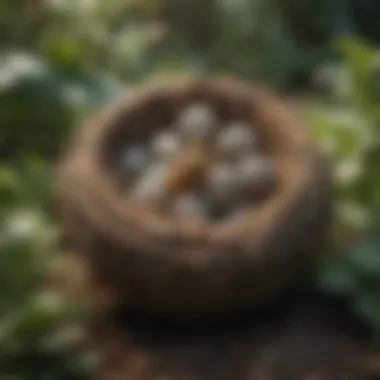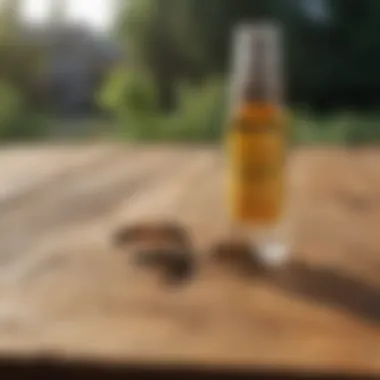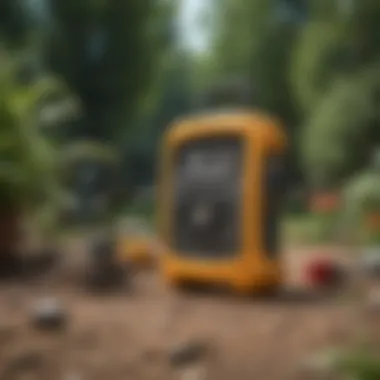Effective Strategies for Hornet Control and Management


Intro
Hornets are not just a nuisance; they can be dangerous. Many homeowners might find themselves unexpectedly faced with a hornet infestation. Understanding how to tackle this problem is crucial for safety and comfort. This article focuses on practical strategies for hornet management, touching on prevention, ecological insights, and effective extermination methods. It equips readers with necessary knowledge to make informed decisions about controlling hornets in their homes.
Key Insights and Trends
Management of pests, including hornets, has evolved over the years. Homeowners are becoming increasingly aware of the balance between effective pest control and ecological awareness. This section explores valuable trends in hornet control that reflect a proactive approach.
- Prevention First: Many people are moving toward preventive measures rather than reactive extermination. By understanding hornet habitats, you can deter their nesting sites early.
- Natural Remedies: An increasing number of individuals are utilizing natural remediation methods. This trend stems from a desire to minimize chemical use and its potential harm to the environment.
- Community Engagement: Many homeowners are sharing their experiences and solutions through forums like Reddit and Facebook groups. This creates a global pool of knowledge on effective hornet management strategies.
"The best defense against hornets is knowing where they thrive and taking action before they settle in."
Practical Tips and How-To Guides
For those facing hornet issues, having practical guides can be beneficial. Here are some effective strategies that homeowners can employ:
Prevention Strategies
- Seal Entry Points: Inspect your home and seal gaps or holes. Hornets can easily enter through small openings.
- Remove Food Sources: Keep trash cans tightly sealed. Hornets are attracted to sugary or protein-rich foods.
- Keep Gardens Clean: Clear fallen fruits and debris. This prevents a food source that attracts hornets.
Extermination Techniques
- Natural Traps: Consider using diluted dish soap in a container filled with water. This can effectively trap hornets without harsh chemicals.
- Professional Services: If the infestation is severe, hiring professional services may be necessary. They have experience and expertise to handle the situation safely.
Safety Precautions
- Always wear protective clothing when dealing with hornets. Avoid bright colors or floral patterns as these can attract them.
- Be cautious and act swiftly to reduce risks of stings.
Prelude to Hornets
Understanding hornets is crucial for homeowners and gardening enthusiasts alike. These insects, often mistaken for wasps, can establish nests in various locations around our homes, creating health risks and pest management challenges. This section lays the groundwork for effective hornet control strategies by detailing their characteristics, behaviors, and the common species that inhabit our areas.
What are Hornets?
Hornets are a type of social wasp belonging to the subfamily Vespinae. They are typically larger than other wasps, with distinct coloration that can range from black to yellow or brown. These insects are known for their potent sting, which they deliver not only as a defense mechanism but also when they feel their nest is threatened. Their nests, made from paper-like material created from wood fibers, often hang from trees or can be found in attics and eaves.
Common Species of Hornets
There are several species of hornets, but the most common ones include the Eastern Hornet, European Hornet, and the Bald-faced Hornet.
- Eastern Hornet (Vespa maculate): Found in the eastern United States, this species is recognizable by its yellow and black markings.
- European Hornet (Vespa crabo): This hornet is larger than its Eastern counterpart and can be found throughout the U.S., originated from Europe.
- Bald-faced Hornet (Dolichovespula maculata): Known for its white and black appearance, this species often builds aerial nests.
Hornet Behavior and Habitat
Hornets are social insects, living in colonies which can range from a few dozen to several thousand members. They are mostly active during the day and are particularly aggressive when it comes to defending their nests. Their habitats vary, as they can build nests in trees, shrubs, or even in man-made structures.
During the summer months, hornet populations peak, leading to increased encounters with humans. Understanding their behavioral patterns and preferred habitats is essential for effective prevention and control strategies.
Important Note: Effective hornet control begins with knowledge. Identifying species and understanding their behavior can significantly reduce risks associated with their presence.
Why Remove Hornets
Removing hornets from your environment is not just a matter of comfort but also a necessity for safety and ecological balance. Understanding the reasons for effective hornet control helps in making informed decisions. Hornets can lead to various health risks, disrupt the harmony in gardens, and present a challenge to home environments.
Health Risks Associated with Hornets


Hornets are known for their aggressive behavior, especially when their nests are threatened. Their stings can cause severe pain, swelling, and in some cases, allergic reactions that may require medical attention.
The venom of a hornet contains toxins that attack the immune system, which can trigger symptoms ranging from mild discomfort to life-threatening anaphylaxis in sensitive individuals. This risk is particularly significant for those who have had allergic reactions to insect stings in the past.
- Common symptoms of hornet stings include:
- Intense pain and swelling
- Redness at the sting site
- Allergic reactions such as hives and difficulty breathing
Taking note of these health risks highlights the importance of monitoring areas where hornets may establish nests to prevent accidents and injuries.
Hornets as Garden Pests
Hornets are not merely nuisances; they can pose a significant problem for gardening enthusiasts. These insects are predatory in nature, feeding on other insects, which may include beneficial species. This relationship can lead to a decline in pollinator populations, negatively affecting flowering plants and crops.
Furthermore, hornets can be territorial and aggressive. This territorial behavior can deter individuals from enjoying outdoor spaces, impacting garden activities and gatherings. Their nests, often built in trees or eaves, can also lead to structural damage if not properly managed.
To mitigate these effects, it is crucial to be proactive in controlling hornet populations. Recognizing their potential as garden pests can empower homeowners to take necessary action, ensuring both safety and the well-being of their garden ecosystems.
In summary, understanding the risks associated with hornets and their negative impact on gardens justifies the effort to remove them. Taking preventative measures and addressing the presence of hornets not only enhances safety but also supports a healthy garden environment.
Preventive Measures
Preventive measures are paramount in managing hornets effectively. They serve as the first line of defense for homeowners who wish to avoid infestations. Implementing proactive steps reduces the likelihood of hornets establishing a nest. This not only protects structures and gardens but also minimizes health risks for individuals and pets. Understanding the specific elements related to preventive measures can enhance their effectiveness.
Site Assessment and Modification
Carrying out a thorough site assessment is crucial. Homeowners should regularly inspect their properties, looking for potential hornet nesting sites. Hornets often prefer sheltered, high locations. This includes overhangs, attics, and tree branches. By identifying these areas early, you can take steps to modify them.
Consider the following points during your assessment:
- Sealing Cracks: Look for gaps or cracks in structures. Seal them with caulk to eliminate access points.
- Trim Vegetation: Regularly trim branches and shrubs that come close to your house. This removes potential nesting sites.
- Regular Cleaning: Keep the area tidy, removing debris, and checking under eaves for any signs of nesting.
Food Source Management
Managing food sources is another essential preventive measure. Hornets are attracted to food residues. This makes controlling their access imperative. Be vigilant about waste management. Keep rubbish bins tightly sealed and clean up outdoor eating areas promptly.
Key strategies include:
- Secure Garbage: Use containers with lids that fit tightly.
- Remove Spills: Immediately clean any spills or leftovers from outdoor dining. This minimizes attractants.
- Control Composting: If composting, use a sealed bin to avoid drawing hornets.
Physical Barriers
Installing physical barriers is an effective tactic. These barriers can help deter hornets from building nests in your vicinity.
Employ these methods:
- Screens on Vents: Install fine mesh screens over vents and windows. This prevents hornets from entering homes.
- Nesting Deterrents: Consider placing decoy nests. Hornets tend to avoid nesting near established colonies.
- Protective Fencing: If you have a garden, consider protective fencing. This can deter hornets from accessing flowering plants and fruits.
Natural Remedies
Natural remedies for hornet control have gained significant attention. Homeowners seek effective alternatives to chemical pesticides. These methods can be both environmentally friendly and cost-effective. This section will cover essential oils and soap solutions, two prominent options that are gaining popularity.
Essential Oils
Essential oils are concentrated plant extracts known for their strong scents and properties. These oils can serve as a deterrent for hornets. Some commonly used essential oils include peppermint, clove, and lemongrass. Their potent aromas disrupt the hornets' ability to navigate. This makes it harder for them to locate their nests or food sources.


Using essential oils can be straightforward. You can dilute a few drops in water and spray the solution around potential nesting areas. It is best to reapply regularly, especially after rain. However, effectiveness might vary based on oil type and concentration used.
- Benefits of Essential Oils:
- Non-toxic options for pest control.
- Pleasant scents for humans, while being off-putting for hornets.
- Minimal environmental impact compared to traditional pesticides.
Soap and Water Solutions
Soap and water are another effective natural remedy. This method involves mixing liquid dish soap with water in a spray bottle. When sprayed directly on hornets, the solution clogs their breathing pores. This method is particularly effective during the evening or early morning when hornets are less active.
- Benefits of Soap and Water Solutions:
- Simple to prepare and use.
- Safe for humans and pets when used correctly.
- Inexpensive compared to commercial insecticides.
However, caution is necessary. Direct contact with hornets can provoke an attack. It’s advisable to take appropriate safety precautions when employing this method.
Remember, natural remedies may not always guarantee complete eradication of hornets. They should be considered as part of a comprehensive strategy for hornet control.
Natural remedies offer a feasible option for hornet management, keeping in mind the environment and personal safety. The combination of essential oils and soap solutions presents a strong case for those preferring gentler methods against these pests.
Chemical Extermination Methods
Chemical extermination methods serve as a crucial aspect in the effective management of hornet populations. While natural remedies and preventive measures can significantly reduce the likelihood of hornet infestations, sometimes, immediate action is needed to eliminate existing nests. Pesticides offer a rapid solution, often providing immediate results. However, there are important considerations including safety, application, and environmental impact that must not be overlooked.
Overview of Pesticides
Pesticides are chemical substances designed to reduce or control pests, including hornets. Various types of insecticides are available specifically formulated for hornet control. These may include aerosol sprays, powders, and baits that can be effectively used to target hornets directly. Each product’s active ingredients vary and can influence the effectiveness and suitability of the pesticide for specific situations.
- Pyrethroids: Commonly used due to their effectiveness against many insect pests, including hornets.
- Insect Growth Regulators (IGRs): They disrupt the hormone processes in insects, preventing growth and reproduction.
- Boric Acid: A less toxic option that can be used in bait formulations, it is effective when hornets consume it and take it back to their nests.
When selecting a pesticide, refer to the label instructions regarding safety measures, environmental protection, and effectiveness on hornets. It is vital to adhere to legal regulations and best practices within your jurisdiction to ensure safe use.
Application Techniques
Applying pesticides requires careful planning and execution. Proper technique directly influences both the effectiveness of the treatment and the safety of those applying it and the surrounding environment.
- Timing: The best time to apply pesticides is during the evening or night when hornets are less active. Avoid windy days to prevent drift.
- Distance: Maintain a safe distance from nests when applying sprays. Many products come in aerosol forms that allow for application from a distance.
- Protective Gear: Always wear personal protective equipment. This includes gloves, long sleeves, and masks to shield yourself from exposure.
- Target Nests: Focus the pesticide directly on the nest entrance or where hornets tend to gather. Ensure the insecticide penetrates the nest for optimal effectiveness.
It is essential to always follow the instructions on the pesticide label strictly to maximize safety and effectiveness.
"Chemical methods can quickly reduce hornet populations, but safety and environmental considerations remain paramount."
Understanding the critical elements of chemical extermination methods enables homeowners to make informed decisions regarding pest management, balancing efficacy against safety and environmental impact.
Professional Extermination Services
Engaging professional extermination services can provide a vital solution for managing hornet infestations. Homeowners are sometimes uncertain on the best course of action when they encounter these pests. An experienced exterminator offers tailored strategies that can lead to effective and lasting results. Moreover, these experts are familiar with local regulations regarding pest control and understand the safest methods for human and environmental health.
Additionally, professionals have access to advanced equipment and techniques that may not be available to the average homeowner. This can include specialized pesticides and traps, ensuring that hornets are not merely removed but also deterred from returning. The knowledge and expertise of an extermination service can significantly reduce the risk of dangerous encounters with hornets.
"When dealing with hornets, safety is paramount. Professionals know how to handle situations that could escalate quickly."
When to Call a Professional
Recognizing the right time to enlist the aid of a professional can make a significant difference in handling hornet problems. If you notice a large nest in a location that poses a risk to yourself or others, such as near entryways or play areas, this is a clear indicator for action. Hornets can become aggressive when their nest is disturbed, which increases the chance of stings.


If you have a known allergy to hornet stings, it’s crucial to involve professionals immediately. Other instances warranting professional assistance include:
- A significant increase in hornet activity.
- Difficulty in accessing the nest due to height or location.
- Previous unsuccessful attempts at DIY treatment.
- The need for long-term control strategies and prevention measures.
Choosing the Right Extermination Service
Selecting the appropriate extermination service requires careful consideration. Not every service is equipped to handle hornet infestations effectively. Here are some aspects to evaluate:
- Experience: Look for companies with a proven track record in handling hornets specifically.
- Certifications: Ensure that the service is certified and adheres to local pest control regulations.
- Reviews: Customer feedback can provide insights into the effectiveness and professionalism of the service.
- Safety Practices: Ask about their methods, especially regarding safety for children and pets.
- Follow-Up Services: A good company will offer follow-up inspections and preventive measures.
Safety Precautions
Safety precautions are essential when dealing with hornets. Their stings can cause serious allergic reactions, making it vital to handle any hornet management strategy with care. Taking appropriate safety measures can significantly reduce the risk of an unwanted encounter.
Personal Protective Equipment (PPE)
Using Personal Protective Equipment (PPE) is critical in protecting oneself when managing hornets. This equipment includes:
- Protective clothing: A full-sleeved shirt and long pants can help shield skin from stings. Special beekeeping suits are highly effective, as they provide complete coverage.
- Gloves: Thick gloves can prevent hornets from stinging your hands during removal or treatment procedures.
- Face protection: A face netting or mask should be worn to protect your face, especially your eyes, from aggressive hornets.
- Footwear: Sturdy, closed-toe shoes are a must. Avoid sandals as hornets might sting exposed skin.
Wearing these items will not only make you less vulnerable but also boost your confidence. You will feel safer while approaching areas where hornets reside.
Avoiding Aggression
Understanding hornet behavior is key to avoiding aggression. Hornets tend to defend their nests fiercely; thus, it is vital to approach hornet territory with caution. Here are practical strategies to minimize aggression:
- Time of day: Plan your interventions early in the morning or late in the evening. Hornets are less active during these times.
- Approach slowly: Sudden movements can trigger defensive behavior in hornets. Move calmly and steadily to avoid provoking them.
- Maintain distance: When you spot a nest, stay away and observe from a safe distance. Avoid hovering around the area unnecessarily.
- No strong scents: Avoid wearing perfume or cologne and refrain from using scented products nearby. Strong odors can attract hornets and incite unwanted attention.
By keeping a respectful distance and using calm actions, you significantly reduce your risk of being stung while managing hornets.
Hornets and Ecological Considerations
Hornets play a crucial role in various ecosystems. Understanding their ecological significance is essential when controlling their populations. Many people view hornets solely as pests, disregarding their benefits. This section highlights the importance of hornets in maintaining biodiversity and outlines the potential consequences of exterminating them.
Hornets' Role in Biodiversity
Hornets serve several ecological purposes. They are key predators of many pest insects, such as flies, caterpillars, and aphids. By controlling these pest populations, hornets contribute to the balance in ecosystems. They help protect plants and crops from infestations. This natural pest control can reduce the need for chemical pesticides, which can harm other wildlife and the environment.
Additionally, hornets themselves are part of the food web. They are preyed upon by birds, mammals, and other insect species. Removing hornets from an ecosystem can lead to population surges of their prey insects, disrupting the natural equilibrium.
Hornets also contribute to pollination. While they are not as efficient as bees, they visit flowers, supporting plant reproduction. Their presence can enhance the overall health of gardens and landscapes. Understanding this role emphasizes the need for mindful management rather than outright extermination.
Implications of Extermination on Ecosystems
Exterminating hornets can have unintended consequences on local ecosystems. While it may provide immediate relief from stings and nests, the long-term effects can be detrimental.
- Disruption of Food Chains: Hornets play a part in various food chains. Removing them can unbalance these chains. Other species may suffer, particularly those that rely on hornets as food.
- Increased Pest Populations: Extermination can lead to more pest insects. This may cause farmers and gardeners to use more pesticides, affecting other beneficial insects and leading to broader ecological harm.
- Loss of Biodiversity: As hornets disappear, the diversity of species in the ecosystem can diminish. This loss can impact plant health and reduce ecosystem resilience to diseases and environmental changes.
In summary, while controlling hornets is sometimes necessary for safety, it is essential to consider their vital roles in the environment. Effective strategies must balance the need for pest control with the need to protect ecological integrity.
"The loss of any species can have cascading effects on ecosystems, reminding us of the intricate balance of nature."
Finale
As we round off this article, it becomes evident that effective hornet control is more than just a method for dealing with a nuisance. The importance of understanding hornets, their behavior, and their ecological role cannot be overstated. This comprehensive guide has highlighted the multifaceted approach required to manage these pests successfully.
Summary of Key Points
In summary, several key points emerge:
- Preventive Measures: Regular site assessments and modifications, managing food sources, and installing physical barriers are crucial in reducing hornet problems. These steps serve as a frontline defense, deterring hornets from establishing nests around homes.
- Natural Remedies and Chemical Extermination: Options vary, from using essential oils and soap solutions to selecting appropriate pesticides. Each method has its benefits and targeted applications, and understanding these enables homeowners to choose wisely based on their situation.
- Professional Services: There are times when hornet infestation exceeds personal control capabilities. Knowing when to call professionals is essential for safety and timeliness, ensuring effective eradication.
- Safety Precautions: Always use appropriate personal protective equipment when dealing with hornets to avoid aggressive encounters. Being prepared is crucial, especially for those venturing into areas known for high hornet activity.
- Ecological Considerations: Appreciating hornets' role in biodiversity is essential for balanced ecosystems. Thoughtless exterminations can lead to imbalances, affecting other species and plant life.



